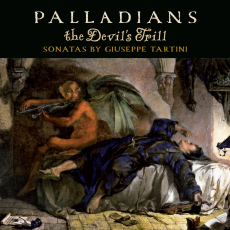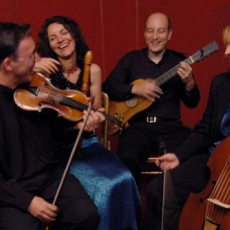Giuseppe Tartini - Palladians - MusicOMH
At the turn of the eighteenth century Italian violin music was seen as something of an extreme sport. Composers challenged musicians to play ever higher, faster and more elaborately, and musicians revelled in the fame that their daring brought. In northern Europe these virtuoso fiddlers were increasingly dismissed as just that - showy charlatans - and posterity has forgotten a plethora of pithy scores.
One Giuseppe Tartini, however, set himself apart from self-publicising contemporaries as if by reverse logic. Studious and serious he lived an almost hermitic existence, composing in code (which was only broken in 1935), and his virtuosic music has survived largely because of its desire for honest expression over flashy effect. Tartini's genius has been celebrated by a number of recent recordings, including a techno tribute from Vanessa Mae, but this latest release from the Palladians (formerly the Palladian Ensemble) is a welcome new addition.
The disc begins with Tartini's best-known work, The Devil's Sonata, from which it takes its name, and with it a highly dramatic soundscape of searing strings. It was inspired by a dream the composer had where the Devil snatched his violin and performed a piece of exquisite beauty, and Tartini lamented that his 'imitation' still paled in comparison, but it remains an astonishing psychological study.
More angst follows with his Didone abandonata sonata, a fascinating interpretation of Dido's abandonment by Aeneas. Like Henry Purcell's earlier Lament it is full of melancholic ardour and bittersweet turns of phrase, but achieves something quite different for being wordless. Furthermore, its three movements allow space for a more expansive arc of emotion, from the curious naiveté of the first, through manic fury, to weary acceptance in the third.
Although reluctant to widen their focus the Palladians have spliced Tartini's work with a Sonata in A Major by Francesco Maria Veracini. Not only does this provide some musical context (and a little light relief) but is intended to illustrate Veracini's skilful cantibile playing, which made a significant and lasting impression on Tartini. This thoughtful programme concludes with Tartini's brighter Pastorale and an isolated movement from a viol concerto that he composed for the cellist Antonio Vandini.
The playing is intense and introverted throughout, tending towards the ponderous (even dirge-like) in slower movements, but justified by the music's exotic beauty, and the recording quality is unquestionable.

